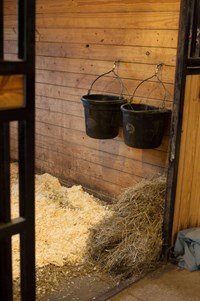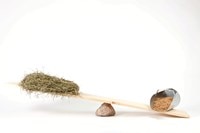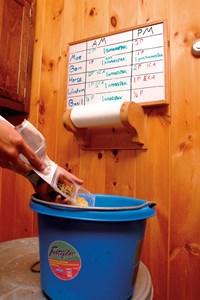How Supplements Complement Horse Feed

By: Dr. Lydia Gray
Every horse owner wants to make the best decisions when it comes to caring for their horse, and that includes feeding the “best” diet. We all know that forage (like hay and pasture) is the foundation of equine nutrition, but somehow the horse industry developed the mindset that horses “need” grain. Actually, what horses need is a diet based on high-quality forage; then their calorie or energy needs met; followed by nutrients such as protein, vitamins, and minerals; and finally additional ingredients to address any specific issues that individual horses might be facing. Let’s look at each of these areas a little bit closer.
Focus on Forage
Horses get most of their nutrition from the forage or roughage they eat. Considering that horses are designed to take in 1-2% of their body weight each day in hay or pasture, it should be no surprise that 10 to 20 pounds (for a 1,000 pound horse) of long-stem plant matter supplies most of the calories, protein, vitamins, and minerals required by the average horse, along with fibrous bulk for a healthy gastro-intestinal tract. To get a better idea of exactly how much of each nutrient is being provided by the roughage you’re providing for your horse, hay analysis or forage testing can be performed. Armed with these “nutrition facts,” the rest of the horse’s diet can be adjusted to ensure he is getting the right amounts and the right ratios of nutrients. Analysis or testing can also be used to select more appropriate hay for a horse on a low non-structural carbohydrate (NSC) diet, a low potassium diet, or other special need.
Counting Calories
As forage makes its way through the intestinal tract to the cecum and colon, its fiber component begins to be digested or fermented by the microscopic organisms that live in the hindgut. When these bacteria or “good bugs” break down the structural carbohydrates that the horse himself cannot, some of the end products are volatile fatty acids (energy), amino acids, and vitamins. Thus, forage is a major source of energy or calories for the horse and additional roughage should not be overlooked as a weight-gain strategy. Because the horse can only eat so much hay or grass in a day though, horses that require more calories to maintain their body condition score, such as hard-working athletes or pregnant and lactating mares, may need a more calorie-dense feedstuff, and that’s where grain comes in.

The word “grain” means many things to many people. To some, it is synonymous with “meal” as in: “my horse gets grained twice a day.” To others, it means any kind of pelleted feed or textured sweet feed, as in: “my horse gets two pounds of grain morning and night.” And finally there is a third group of people who literally mean whole cereal grain such as oats, corn, or barley. None of these definitions are wrong, they just point out how important it is to be sure and talk apples to apples and oranges to oranges when discussing a horse’s diet. So here are some definitions to make sure everyone is on the same page:
Complete Feed: a manufactured feed that combines grain and roughage; designed to partially or completely replace a horse’s forage, usually due to dental problems or because quality hay is not available (aka “senior” feed, serving size 15-20 lbs daily).
Fortified Grain: a manufactured feed that includes added guaranteed levels of protein, vitamins, and minerals; common types include pelleted and sweet feeds (aka “concentrate,” serving size 5-9 lbs daily).
Whole Grain: a cereal grain that has not been fortified with additional nutrients; may be processed by cracking, crimpling, rolling, or heating (examples: oats, corn, barley; serving size 1-5 lbs, or quarts daily).
Ration Balancer: a concentrated feedstuff, usually a pellet, designed to complete and balance a forage-only diet by providing protein, vitamins, and minerals; not a significant source of calories or sugars/starches so ideal for easy-keepers and others who don’t need or can’t have additional sugars and/or calories (serving size 1-2 lbs daily).
Multi-Vitamin/Mineral Supplement: a powder or pellet designed to fill in some of the
gaps between the vitamins and minerals provided by forage containing a sufficient
level of high-quality protein; not a significant source of calories or sugar/starches so also
ideal for easy-keepers and others who don’t need or can’t have additional sugars and/or calories (serving size 1-2 ounces daily).

Now that the horse is receiving a complete and balanced, forage-based diet, it’s time to see if there are any issues being faced that could benefit from the additional support of targeted ingredients. Sixty percent of lameness is due to arthritis – could a joint supplement with glucosamine, chondroitin sulfate, hyaluronic acid, MSM, and other ingredients complement veterinary recommendations? Colic is the leading cause of death in horses after old age, so consider supplement ingredients like prebiotics, yeast, and enzymes that support hindgut health for high-risk individuals. “No hoof, no horse” is a common saying because it’s so true. A hoof supplement containing biotin and other ingredients may be helpful for the horse that struggles to maintain healthy feet. Don’t let inadequate levels of nutrients like magnesium, B vitamins, and even certain amino acids contribute to a worrisome demeanor in your horse; support a normal disposition with a supplement from the calming category. Finally, it has been shown that over 60% of performance horses have gastric ulcers. Talk to your veterinarian about the research behind a supplement with ingredients like sea buckthorn, glutamine, aloe vera, pectin, lecithin, and licorice.
The point is: feed your horse appropriately by first, focusing on forage; second, ensuring he’s getting the right amount of calories for his workload; third, rounding out his diet with the rest of the vital nutrients protein, vitamins and minerals; then finally, work with your veterinarian to address unique concerns that may benefit from a targeted supplement approach.
SmartPak strongly encourages you to consult your veterinarian regarding specific questions about your horse's health. This information is not intended to diagnose or treat any disease, and is purely educational.